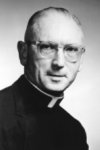
AnthonyFlood.com
Philosophy against Misosophy

Francis Canavan, S.J.
1918-2009
Francis Canavan, S.J.
1918-2009
Knowing What Is Good [1994]
Reply to Flood's Letter [1994]
Anthony Flood, Letter to Francis Canavan, S.J., about "Knowing What Is Good" [1994]
A prominent Catholic intellectual and political theorist, Francis Canavan was born in New York City in 1917, joined the Society of Jesus in 1939, and was ordained in 1950. After receiving his doctorate from Duke University in political science in 1957 (where he studied under John H. Hallowell), Canavan taught at St. Peter’s College and served as associate editor of America before joining the faculty of Fordham University, where he taught from 1966 until his retirement in 1988.
Best known as one of the world’s preeminent Burke scholars, Canavan is the author of three books exploring various aspects of Burke’s thought: The Political Reason of Edmund Burke (1960), Edmund Burke: Providence and Prescription (1987), and The Political Economy of Edmund Burke (1995). In these volumes and his other writings on Burke, Canavan has sought to restore Burke to his rightful place among the pantheon of Christian natural law thinkers by showing that Burke’s thought had a fundamentally Thomistic character.
Canavan has also written on the political theory of freedom of speech (Freedom of Expression: Purpose as Limit, 1984), as well as on Catholicism and American culture and contemporary America’s search for a public philosophy. Some of his most important writings on the latter subjects are collected in Pins in the Liberal Balloon (1990) and The Pluralist Game: Pluralism, Liberalism, and the Moral Conscience (1995). At the heart of these writings is a far-ranging critique of the liberal individualist intellectual tradition. Understanding liberal political theory to be shaped in important ways by the liberal tradition’s philosophical commitments (in particular, by its embrace of a nominalist metaphysics), Canavan argued that the liberal model of man and society is flawed because it is incompatible with the Christian understanding of the nature and destiny of the human person and corrosive of the matrix of institutions, convictions, and virtues on which a democratic society depends for its vitality and ultimately its very viability. He further argued that the claim of liberalism to be “neutral” on the whole question of the human good is specious and turns politics into “a shell game” in which, in the name of neutrality, social life is reorganized in accordance with liberalism’s distinctive and highly controversial vision of the human good.
—Kenneth Grasso
from First Principles